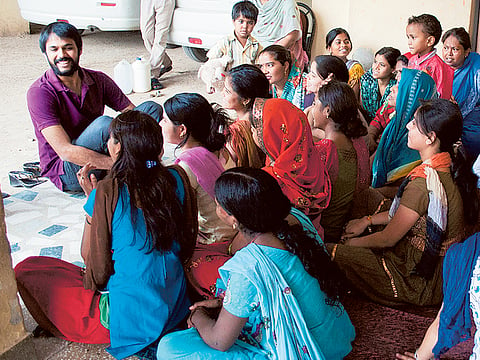IIT techie gives up career for women safety
Launches programme for gender sensitisation and action against gender based violence

New Delhi: In the wake of infamous Delhi gang rape incident of December 2012, a young techie, listening to that little voice in his head, decided all at once to sacrifice his promising career on the altar of women safety and empowerment in India.
Deeply disturbed by the Nirbhaya gang rape case which jolted the country out of its slumber, Aditya Gupta, now 27, from the prestigious Indian Institute of Technology (IIT)-Delhi, went whole hog to establish a sustainable change programme — People for Parity (PfP) — for gender sensitisation and addressing the malaise of Gender Based Violence (GBV) in India.
“When I first heard of the Nirbhaya case, I was in Kenya volunteering with a non-governmental organisation ‘TechnoServe’. Hearing of Nirbhaya triggered confusion and grief and also a feeling of helplessness. Her strength and the strength of thousands who had taken to the streets gave me hope over the subsequent days. I had never felt more physically distant and more emotionally connected to my home in Delhi,” Gupta tells Gulf News.
Three years down the line, Gupta’s small and growing youth-led social initiative has gone on to address myriad issues and touch the lives of women in ways that he never fathomed.
“I felt discontent working in a consulting job where I was earning money to help people who had lots of money, collect money from other people who had lots of money. I felt like I was abusing any intelligence that I possessed. I have also felt strongly about people needing to have the space to be who they are, and I feel gender based violence strongly violates that personal space, my principles and my sense of comfort in this country and world. I felt it was natural for me to work on solving a problem I feel so strongly about,” he explains.
In multiple, powerful ways, Gupta’s efforts have been paying off.
“I think I sacrificed what was headed to be a standard, mediocre career for taking up one of the biggest problems that we are faced with today. In that sense, I think I have a much more brilliant career in the making right now. The amount of learning and expertise I have had to gather to work on the issue far exceeds what I needed to learn to be a good consultant,” he says.
PfP’s work is based on a thoughtful amalgamation of two methodologies — Pukar, a short-term technological approach and Pratiti, their core, long-term, workshop based approach. Through these processes, the organisation has been continuously developing strong networks of young people, police and other relevant stakeholders across multiple geographies with whom it works to create locally led gender programmes that help individuals challenge GBV in their own lives and communities.
Gupta’s team of three other techies — banker Raman Khatri from the UK, software developer from Delhi Ravikant Bhargava and University of Illinois Masters student Shashank Yaduvanshi — have developed a women safety app ‘Pukar’ which has now become a hit with women in India. The IIT-Delhi graduate trio created the technology while Gupta roped in the police and handled the social impact of it.
The app was designed in such a way that once the user presses the red button, specific contacts in their phone and the police control room get intimated about their location through the phone’s global positioning system (GPS), mobile data or tower. While developing the app just took a month, creating a police partnership took over a year.
“Unlike other safety apps that mushroomed around the same time, Pukar tied up with the police to help people. With other apps, it seemed like the onus of providing a safe ecosystem was being shifted to people. But the police form an important part of the process, and it does not make sense to exclude them from it. So we created a technology that will help us link up with the police,” Gupta explains.
His family has largely been supportive of his ideas.
“My family values my happiness and engages very actively with my work. They struggle with the different values or notions I bring in sometimes; but we are a family that communicates regularly and openly and that helps us support each other,” he says.
Gupta, however, is not very upbeat about the current women safety scenario in India.
“I do not think much has been done since the Nirbhaya case. In fact, I saw how women’s safety was a massive pitch point in the run up to the Delhi elections but have not seen much in terms of action since then. It seems to have become a valuable political instrument; which makes me worry that just like our caste and religious issues, this is here to stay till it has meaning for mainstream politicians,” he states.
Many other women rights activists agree with Gupta.
“The safety scenario continues to be the same as always because I think while we have had a legal change and much more conversation about rape and street harassment, safety still is a misunderstood term. A vast majority of violence that women face in India is from people they know, within their homes, streets and schools. There is little conversation about that,” says Mumbai-based women rights activist Monica Rajpal.
Sign up for the Daily Briefing
Get the latest news and updates straight to your inbox


